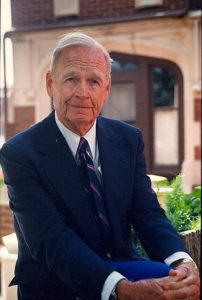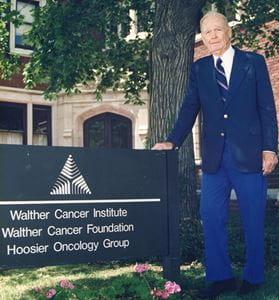
Photo info ...
Credit: Indiana University IndianapolisView Source
(Nov. 24, 1912-Dec. 10, 2005). Joseph Edward Walther was born and raised in Rushville, Indiana. In his youth, Walther was an athlete who was on the basketball, football, and track teams. He qualified for the 400m hurdles in the 1932 Olympic Games.
Walther attended . He graduated in 1936 with his M.D., specializing in internal medicine and gastroenterology. Walther chose to complete his residency through the military and was officially accepted as a first lieutenant medical resident in the U.S. Army Air Corps on July 27, 1936.
During World War II, Walther served in the Pacific Theater as a flight surgeon. For his actions, he earned multiple medals–the Silver Star, the Soldiers’ Medal, the Bronze Star, and the Air Medal. After the war, Walther went into the reserves and served for a total of 24 years before retiring as a colonel.
Walther returned to Indiana in 1945 after ending active service in the military. On July 1st, he became reacquainted with childhood friend Mary Margaret Ruddell. Ten days later on July 10th, the pair married. The couple went on to have six children–Suzanne, Mary Ann, Joanne, Diane, Kurt, and Karl.
By the late 1940s, Walther began his civilian career practicing and teaching medicine as well as founding multiple organizations to provide better quality health care to the Indianapolis community. In 1948, he began working as an assistant professor of medicine at Indiana University School of Medicine, and he also founded the Memorial Clinic of Indianapolis.

One of Walther’s larger contributions to medical care in Indianapolis came in 1956. Walther founded Winona Memorial Hospital, which he named after his mother, Winona McCampbell Walther. The hospital was born out of Walther’s frustration with the lack of hospital beds for his emergency patients.
In addition to managing , Walther spent the next couple of decades working towards bettering the medical field through various work. In 1970, he served as president for the American College of Gastroenterology (and was also a Life Fellow). This same year, Walther also began his decade-long post as the Gastroenterology Section Council Chairman of the American Gastroenterological Association. Back to his military roots, Walther joined the Society of Medical Consultants to the Armed Forces in 1971. From 1982 to 1983, he served on the Editorial Research Board of Postgraduate Medicine.
Tragedy struck in 1983 when Mary Margaret died of colon cancer. After watching his beloved wife suffer from both cancer and the treatments, Walther pledged to eliminate cancer and the suffering it causes. As part of this pledge, Walther sold Winona Memorial Hospital in 1985. He used the over $30 million profit from the sale to establish the (previously Walther Cancer Institute). Through this organization, Walther devoted the rest of his life and work to funding cancer research in hopes of finding a cure.
Walther continued his work as a doctor, teacher, and health care advocate until his death in 2005.
Walther received many awards for the important contributions he made to the medical field in Indianapolis, including Master of the American College of Gastroenterology in 1990. He was one of the recipients of the Indiana Historical Society’s Indiana Living Legends in 2003.

Help improve this entry
Contribute information, offer corrections, suggest images.
You can also recommend new entries related to this topic.